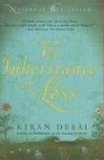Summary | Excerpt | Reading Guide | Reviews | Beyond the Book | Readalikes | Genres & Themes | Author Bio

“Say, ‘Jai Gorkha,’” they said to the judge. “Gorkhaland for Gorkhas.”
“Jai Gorkha.”
“Say, ‘I am a fool.’”
“I am a fool.”
“Loudly. Can’t hear you, huzoor. Say it louder.” He said it in the same empty voice.
“Jai
Gorkha,” said the cook, and “Gorkhaland for Gorkhas,” said Sai,
although they had not been asked to say anything. “I am a fool,” said
the cook.
Chuckling, the boys stepped off the veranda and out
into the fog carrying the two trunks. One trunk was painted with white
letters on the black tin that read: “Mr. J. P. Patel, SS Strathnaver.”
The other read: “Miss S. Mistry, St. Augustine ’s Convent.” Then they were gone as abruptly as they had appeared.
“They’ve
gone, they’ve gone,” said Sai. Mutt tried to respond despite the fear
that still inhabited her eyes, and she tried to wag her tail, although
it kept folding back between her legs. The cook broke into a loud
lament:
“Humara kya hoga, hai hai, humara kya hoga,” he let his voice fly. “Hai, hai, what will become of us?”
“Shut
up,” said the judge and thought, These damn servants born and brought
up to scream. He himself sat bolt upright, his expression clenched to
prevent its distortion, tightly clasping the arms of the chair to
restrict a violent trembling, and although he knew he was trying to
stop a motion that was inside him, it felt as if it were the world
shaking with a ravaging force he was trying to hold himself against. On
the dining table was the tablecloth he had spread out, white with a
design of grapevines interrupted by a garnet stain where, many years
ago, he had spilled a glass of port while trying to throw it at his
wife for chewing in a way that disgusted him.
“So slow,” the boys had taunted him. “You people! No shame. . . . Can’t do one thing on your own.”
Both
Sai and the cook had averted their gaze from the judge and his
humiliation, and even now their glances avoided the tablecloth and took
the longer way across the room, for if the cloth were acknowledged,
there was no telling how he might punish them. It was an awful thing,
the downing of a proud man. He might kill the witness.
The cook
drew the curtains; their vulnerability seemed highlighted by the glass
and they appeared to be hanging exposed in the forest and the night,
with the forest and the night hanging their dark shaggy cloaks upon
them. Mutt saw her reflection before the cloth was drawn, mistook it
for a jackal, and jumped. Then she turned, saw her shadow on the wall,
and jumped once more.
It was February of 1986. Sai was seventeen, and her romance with Gyan the mathematics tutor was not even a year old.
When
the newspapers next got through the road blocks, they read: In Bombay a
band named Hell No was going to perform at the Hyatt International.
In Delhi, a technology fair on cow dung gas stoves was being attended by delegates from all over the world.
In
Kalimpong, high in the northeastern Himalayas where they lived—the
retired judge and his cook, Sai, and Mutt—there was a report of new
dissatisfaction in the hills, gathering insurgency, men and guns. It
was the Indian-Nepalese this time, fed up with being treated like the
minority in a place where they were the majority. They wanted their
own country, or at least their own state, in which to manage their own
affairs. Here, where India blurred into Bhutan and Sikkim, and the army
did pullups and push-ups, maintaining their tanks with khaki paint in
case the Chinese grew hungry for more territory than Tibet, it had
always been a messy map. The papers sounded resigned. A great amount of
warring, betraying, bartering had occurred; between Nepal, England,
Tibet, India, Sikkim, Bhutan; Darjeeling stolen from here, Kalimpong
plucked from there—despite, ah, despite the mist charging down like a
dragon, dissolving, undoing, making ridiculous the drawing of borders.
Copyright © 2006 by Kiran Desai. Reprinted with permission from Grove Atlantic, Inc. All rights reserved.
Give me the luxuries of life and I will willingly do without the necessities.
Click Here to find out who said this, as well as discovering other famous literary quotes!
Your guide toexceptional books
BookBrowse seeks out and recommends the best in contemporary fiction and nonfiction—books that not only engage and entertain but also deepen our understanding of ourselves and the world around us.